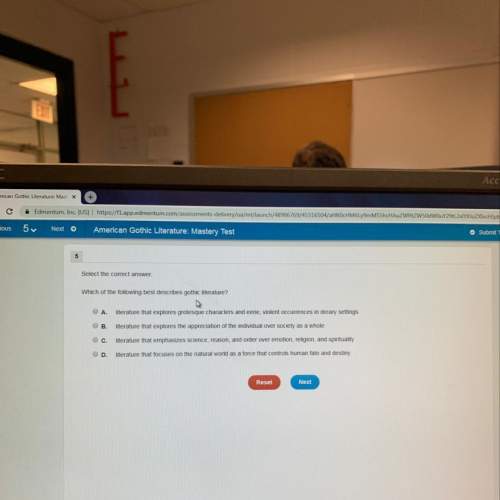
English, 18.03.2021 01:20, yentel110306
While on the run, Montag encounters, "A carful of children, all ages, God knew, from twelve to sixteen" (122). What happens next?

Answers: 3
Other questions on the subject: English

English, 21.06.2019 17:00, zitterkoph
Ineed advice. i have a lot of friends at school but recently my best friend for some reason didn’t like our friend group. she wanted to switch to a new table during lunch. she said she found a new table where we would be welcomed if i wanted to come. i agreed because i knew i would continue to talk to them outside of lunch. after a month or two, my best friend got mad at our new lunch table group. so she left for a day or two, but i stayed because i actually kinda liked it there, even if it was kinda crazy. then she came back to the table. eventually i started to miss my old friends at my old lunch table. so i went over there for one lunch. then after lunch i sat at my new lunch spot before the bell rang. they all called me a traitor. so now i sit with my old lunch group, which is fine because i missed them, but i also miss my new, now old, lunch table. what should i do? p. s. sorry if you loose your last brain cells trying to understand this.
Answers: 2

English, 21.06.2019 20:30, hannahhh565
Which best defines a literary stereotype and its purpose in literary? a- a literary stereotype is a term used interchangeably with prejudice. b- a literary stereotypes creates conflict and contrast how a character may seem with who a character really is. c- a literary stereotypes has no purpose in literary in literary expect to reveal prejudice and express the views of an antagonist. d- a literary stereotype is a way for the writer to indicate whether a character is good or evil, a protagonist or an antagonist.
Answers: 3

English, 21.06.2019 21:10, AnastaziaOpfer3822
5read the following sentence from kennedy's inaugural speech. and so, my fellow americans, ask not what your countfor you; ask what you can do for your country. ot what your country can dothis sentence is an example of an antimetabole, a rhetorical device in whichthe speaker reverses the order of repeated words. antimetabole is used toplace added emphasis on the final part of the statement. which of thefollowing is also an example of antimetabole? a"this nation, for all its hopes and boasts, will not be fully free until itscitizens are free." – john f. kennedy, 1963"forgive your enemies, but never forget their names."- john f. kennedy, quoted in 1984 by ed kochc"mankind must put an end to war, or war will put an end to mankind."- john f. kennedy, 1961d"a man may die, nations may rise and fall, but an idea lives on."- john f. kennedy, 1962
Answers: 1
Do you know the correct answer?
While on the run, Montag encounters, "A carful of children, all ages, God knew, from twelve to sixte...
Questions in other subjects:

History, 22.03.2021 04:40

Mathematics, 22.03.2021 04:40

Mathematics, 22.03.2021 04:40

Mathematics, 22.03.2021 04:40

English, 22.03.2021 04:40

Biology, 22.03.2021 04:40










